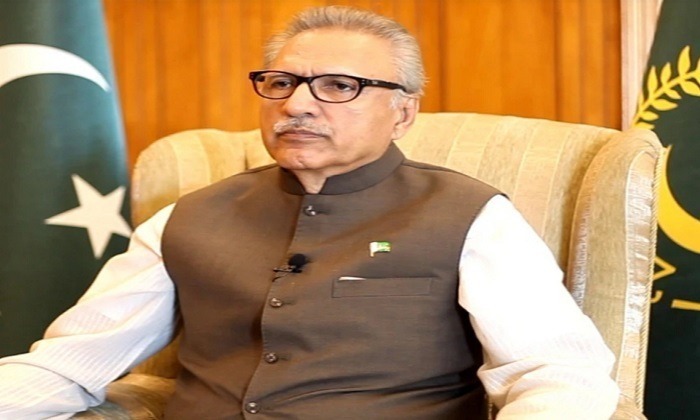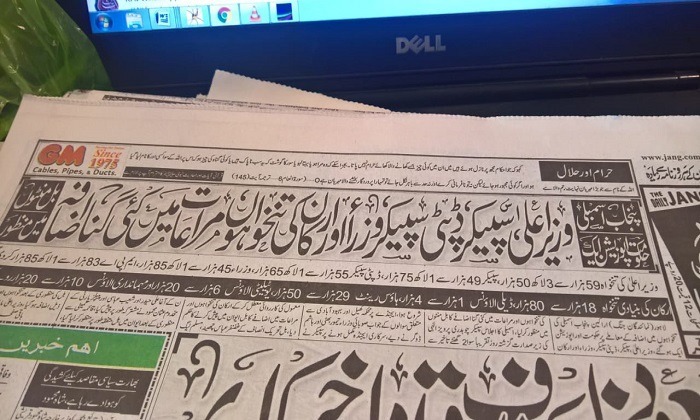SC’s ruling against President Arif Alvi paves way to his removal
By Zaib Azkaar Hussain
Karachi
The experts on law and the Constitution of the country express their apprehension that the ruling of the apex court could lead either disqualification (impeachment) or removal of the sitting president who in the eye of the Supreme Court (SC) of the country committed clear violation of Article 209 (5) of the Constitution by failing to form a well-considered opinion on the matter of disqualification of a judge on the advice of the federal government headed by the prime minister Imran Khan.
The observation of the court even accused the president, Dr Arif Alvi of being obedient instead of being custodian of the constitution in forming his opinion.
In other words, the SC raised question about the integrity of the premier as well in accordance with the constitutional fairness and duties.
The experts note that in order to avoid any legal and constitutional disputes the president could quit or file a petition seeking a sound legal clearance on his role. Otherwise, the opposition parties can exploit the matter to a great extent causing another legal crisis, expert claim.
The president had failed to examine and form his well-considered opinion on a presidential reference (levelling serious allegation against Justice Qazi Faez Isa) before moving it to the Supreme Judicial Council (SJC).
The SC has also recommended legal action against the federal law minister who played a rather illegal role in this case.
A judge, Justice Afridi declared that President Arif Alvi failed to discharge his constitutional obligations as ordained under Article 209(5) of the Constitution by showing blatant and uncalled-for obedience to the “advice” of the prime minister for filing the reference against a sitting judge of the apex court.
The detailed judgment in the Justice Qazi Faez Isa case, announced on Friday (October 23) with Justice Yahya Afridi’s dissenting note recommended criminal proceedings against Law Minister Farogh Naseem and Assets Recovery Unit (ARU) Chairman Mirza Shahzad Akbar, among others.
In his dissenting note, Justice Afridi, who had earlier dismissed Justice Isa’s petition but allowed superior bars petitions against the presidential reference, has given a detailed reasoning as to why he reached such conclusions and for what reasons the law minister and others have exposed themselves to criminal proceedings.
“The direction of the law minister and the ARU chairman to solicit, obtain and receive confidential information regarding the income tax returns of Justice Isa and Mrs Sarina Isa, prima facie, exposes them to criminal prosecution for having committed an offence under Section 199 read with sections 198 and 216(1) of the Ordinance,” Justice Afridi observed.
Interestingly, Justice Afridi marks it clear that “no constitutional immunity from prosecution would be available to the law minister or any other federal minister for issuing directions to obtain legally confidential information, and that too in the face of the said direction to an officer of the government to commit an offence under the ordinance.”
The Justice further declared the law minister and the ARU chairman lacked the mandate to initiate an inquiry against a sitting judge of the Supreme Court, as the legal domain to do so rests solely with the Supreme Judicial Council, and none other.
Justice Afridi observed that [They; lawyers challenging the act of the federal government] have been able to successfully establish that the worthy president grossly failed to exercise his discretion as mandated under the Constitution and, thus, the entire process built thereon leading to the filing of the reference was in violation of the law and the Constitution,” he declared.
“I hold that the worthy president has grossly failed to discharge his constitutional obligations as ordained under Article 209(5) of the Constitution,” his dissenting note reads, adding that the formation of the “opinion” by the president was, it seems, muddied by the blatant and uncalled for obedience to the “advice” of the prime minister. Justice Afridi even went to say on Abdul Waheed Dogar’s complaint, “A proxy of disgruntled elements in the ruling establishment.”
Justice Afridi concluded that noting his lack of standing as a journalist, as his complaint was obtained by surveillance by the intelligence agencies on the directions of the federal government.
The minority judgment reads that the accountability of judges is and shall remain the “essential lifeblood for a democratically vibrant society” as lawful and transparent accountability of judges would further bolster the independence of the judiciary, boast public trust, and thus, promote the rule of law in the country. “And to consider otherwise would be to accede to judicial autocracy,” he concluded.
The judgment has raised serious legal questions about the authority due to which the government takes liberty and did not bother to rethink and reconsider the matter of legality when it decides to level serious corruption charges against someone.
Ends



































